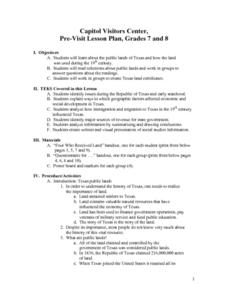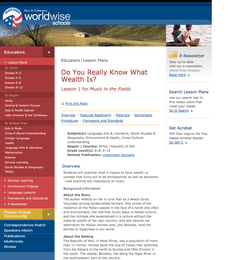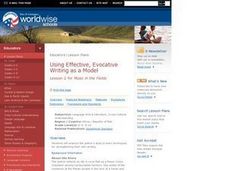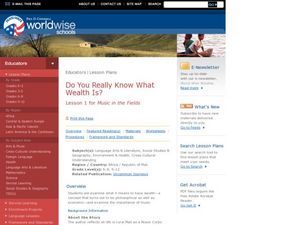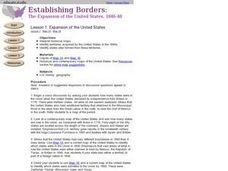Curated OER
Capitol Visitors Center, Pre-Visit Lesson Plan, Grades 7 and 8
Students, through lecture and discussion, identify public lands of Texas and how the land was used during the 19th century. They read selections about public lands and work in groups to answer questions about the readings. In groups,...
Curated OER
Character Education: Responsibility
Middle schoolers study Manuel de Zavala and his role in the history of Texas. In this character education lesson, students read about Manuel Lorenzo and underline the responsibilities he took on in his life. Middle schoolers then answer...
Briscoe Center for American History
Applying the SOAPS Method of Analyzing Historical Documents
Young historians use the SOAPS (Speaker, Occasion, Audience, Purpose, Subject) method of questioning to determine the historical value of primary source documents. The third in a series of five lessons that model for learners how...
Curated OER
Spreading the Word
Fourth graders research and discuss the importance of Gail Borden and his printing press to the history of Texas. They write a newspaper article from Gail Borden's viewpoint.
Curated OER
Shelby County: The Regulator-Moderator War
Seventh graders comprehend the importance of the Regulator-Moderator War through John W. Middleton's memoir. They comprehend how the different motivations held by each faction began the conflict. Students are shown the map of Shelby...
Curated OER
What are Quarters Made of?
Pupils study the meaning, symbolism, and value of U.S. coins,
especially the quarter. They l research why in 1965 the U.S. Mint decided to
change the metal composition of the quarter to copper coated with zinc. In addition, they perform...
Curated OER
Do You Really Know What Wealth Is?
Students examine what it means to have wealth-a concept that turns out to be philosophical as well as economic-and examine the importance of music. They examine the concepts of wealth in Mali and in the United States and consider the...
Curated OER
Using Effective, Evocative Writing as a Model
Students analyze the author's style to learn techniques for strengthening their own writing. They re-read "Music in the Fields" and highlight images that create vivid pictures in their minds-places where Young "shows, not tells" and...
Curated OER
Identifying and Using Parallelism and Balance in Literature
Students examine the story for use of balanced sentences and parallelism-two literary devices-and then practice using those devices in writing of their own. They combine the simple sentences grammatically into one correct sentence. A. I...
Curated OER
Sleuthing a Writer's Skills
Students examine the author's lively text to determine how she achieved her many literary effects. They discover the author's techniques in describing people and events, in setting tone, and in establishing pace. They reflect about the...
Curated OER
Librarian, Legacy Keeper
Young scholars brainstorm a list of all the kinds of items kept in a library. They answer questions about the job of a librarian then they write a three-paragraph essay about the work of a librarian.
Curated OER
Identifying and Using Parallelism and Balance in Literature
Analyze the use of balanced sentences and parallelism in a narrative. Included in this resource is a narrative about serving as a Peace Corps volunteer in Kazakhstan titled, "The Train Ride Home". Middle and high schoolers review...
Curated OER
Using Effective, Evocative Writing as a Model
Students study an author's style to strengthen their own writing. They read an author's account of the resiliency of the Malian people and about their culture. They examine her focus on Malian women.
Curated OER
Do You Really Know What Wealth Is?
Students explore what it means to have wealth in Mali and in the United States. In this economics lesson, students read "Music in the Fields." Student groups answer discussion questions. Students reflect on the purpose music serves in...
Curated OER
The Importance of Being Flexible and Open-minded as a Visitor to Another Culture: Lesson 2 For "The Train Ride Home"
Students examine the advantages of being flexible when visiting or living in a different culture. They read and discuss a first-hand account by a Peace Corps volunteer in Kazakhstan, and write a letter from the point of view of a...
Curated OER
Sleuthing A Writer's Skills
Students read The Train Ride Home by Robin Solomon. In this literature response lesson, students will inspect the writing of Solomon to determine how she established a certain tone through her word choice and paragraph structure....
Curated OER
Expansion and Reform: Applying the Declaration of Independence
Students conduct inquiries and research-acquiring, organizing, analyzing, interpreting, evaluating, and communicating facts, themes, and general principles operating in American history. They use the Declaration of Independence to...
Curated OER
"An American Story"--The Responsibility of Citizenship
Students describe the importance of being a responsible citizen. In this philanthropic actions activity, students view "An American Story" and identify examples from the movie. Students discuss and recognize philanthropic behaviors in...
Curated OER
The Expansion of The United States, 1846-1848
Students interpret historical maps,identify territories acquired by the United States in the 1840s. Also they identify states later formed from these territories. The primary sources for the lesson are the maps found in the lesson's...
Other popular searches
- Texas Republic
- Texas Republic and Statehood
- Texas Republic Six Flags
- New Republic of Texas
- The Republic of Texas
- Republic of Texas Weather
- Republic of Texas Presidents


